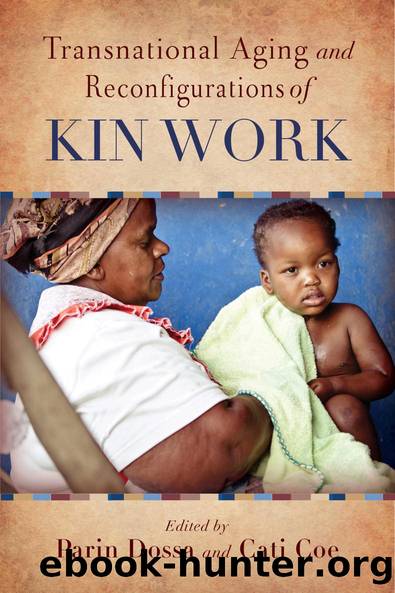Transnational Aging and Reconfigurations of Kin Work by Parin Dossa Cati Coe

Author:Parin Dossa, Cati Coe [Parin Dossa, Cati Coe]
Language: eng
Format: epub
ISBN: 9780813588094
Barnesnoble:
Publisher: Rutgers University Press
Published: 2017-03-10T00:00:00+00:00
Implications and Recommendations
As an immigrant-receiving country with a below-replacement fertility rate, Canada needs university-educated and highly skilled immigrants to contribute to the growth of its economy. Canadaâs points system of immigration, which favors highly qualified applicants, has done fairly well in attracting university-educated immigrants since the 1970s up until the early 2000s; however, more recently, the poor economic outcomes of well-educated new immigrants with regard to the relative wage gap and other challenges of settlement are indicators that the country has actually fared poorly in comparison to the United States (Statistics Canada 2011). These challenges, as Yanqiu Rachel Zhou (this volume) has also pointed out, are further exacerbated for many immigrant South Asian women who must simultaneously juggle the demands of settlement with the challenges of providing care for their older relatives at home. Although their older (mainly female) relatives may provide support at home, such as assistance with childcare and domestic chores, previous research has indicated that multigenerational living is reciprocal and beneficial only when older relatives are healthy and able (Leung and McDonald 2007).
The findings from this study also suggest that these women may employ spirituality, religious beliefs, and dharma and karma as coping mechanisms to offset the unique challenges they encounter. In fact, as Saba Mahmood (2011), in her ethnographic study of womenâs piety movements in the mosques of Cairo, Egypt, has pointed out, cultural and historical factors often mediate the sense of self and agency. For the women in her study, it was not necessarily freedom from the traditional patriarchal structures that they sought; rather, they used those very cultural prescriptions to navigate the dynamic terrains of settlement and kin work, developing a fluid and relational sense of self in the process. Indeed, to quote Mahmood: âWhat may appear to be a case of deplorable passivity and docility from a progressivist point of view, may actually be a form of agencyâbut one that can be understood only from within the discourses and structures of subordination that create the conditions of its enactmentâ (2011, 14â15).
Given this, from a Westernized perspective on freedom and equality, there is also a strong possibility that the stoicism and resilience of these women may render their needs invisible in the broader domain of policy and practice. For example, some of the tasks categorized as âelder careâ on the 2007 General Social Survey (GSS) include meal preparation, house cleaning, laundry, sewing, and assistance with personal care such as bathing (Statistics Canada 2008). This quantification of care work may lead to misleading statistics for immigrant South Asian caregivers as they may conceptualize the provision of care to their older relatives in more culturally congruent, fluid and less structured terms. The implications of this incongruence in the understanding of what constitutes care work may be that immigrant women remain unaware of available programs and services and therefore experience caregiver burden in multiple domains, including finances and health, as they try to do everything themselves.
In addition, of those who were aware of existing resources, most indicated
Download
This site does not store any files on its server. We only index and link to content provided by other sites. Please contact the content providers to delete copyright contents if any and email us, we'll remove relevant links or contents immediately.
Cecilia; Or, Memoirs of an Heiress — Volume 1 by Fanny Burney(32527)
Cecilia; Or, Memoirs of an Heiress — Volume 2 by Fanny Burney(31928)
Cecilia; Or, Memoirs of an Heiress — Volume 3 by Fanny Burney(31916)
The Great Music City by Andrea Baker(31902)
We're Going to Need More Wine by Gabrielle Union(19020)
All the Missing Girls by Megan Miranda(15895)
Pimp by Iceberg Slim(14465)
Bombshells: Glamour Girls of a Lifetime by Sullivan Steve(14039)
For the Love of Europe by Rick Steves(13825)
Talking to Strangers by Malcolm Gladwell(13332)
Norse Mythology by Gaiman Neil(13318)
Fifty Shades Freed by E L James(13216)
Mindhunter: Inside the FBI's Elite Serial Crime Unit by John E. Douglas & Mark Olshaker(9299)
Crazy Rich Asians by Kevin Kwan(9262)
The Lost Art of Listening by Michael P. Nichols(7480)
Enlightenment Now: The Case for Reason, Science, Humanism, and Progress by Steven Pinker(7288)
The Four Agreements by Don Miguel Ruiz(6729)
Bad Blood by John Carreyrou(6601)
Weapons of Math Destruction by Cathy O'Neil(6249)
